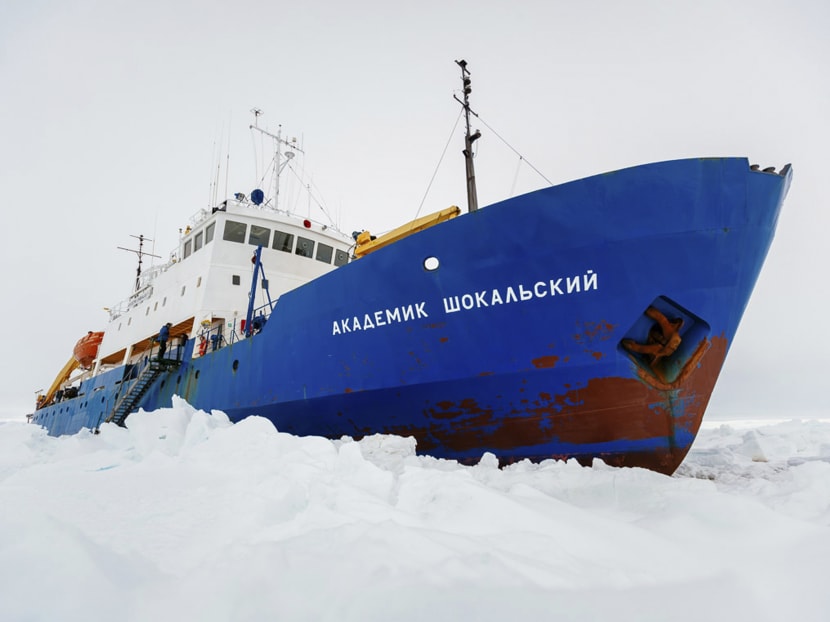Getting unstuck: Dispelling myths about the Antarctic
LONDON — Yesterday’s helicopter rescue of the crew of Russian vessel MV Akademik Shokalskiy put an end to more than one week of drama, after the ship became trapped in ice off Antarctica, while on a mission to follow the footsteps of historic Antarctic explorer and scientist Douglas Mawson.

Russian ship MV Akademik Shokalskiy trapped in thick Antarctic ice 1,500 nautical miles south of Hobart, Australia. Photo: AP
LONDON — Yesterday’s helicopter rescue of the crew of Russian vessel MV Akademik Shokalskiy put an end to more than one week of drama, after the ship became trapped in ice off Antarctica, while on a mission to follow the footsteps of historic Antarctic explorer and scientist Douglas Mawson.
Some climate change sceptics said the ship’s icy predicament showed that climate change is not as serious as scientists say. Sydney’s Daily Telegraph said the stranding was a hard lesson for those who persistently exaggerate the impact of global warming.
To help clear up the confusion, here are some facts about the Antarctic.
NOT LIKE THE ARCTIC
The Antarctic is an enormous frozen continent that covers about a fifth of the southern hemisphere. It is the driest and windiest continent, covered by ice that can reach 4km deep. Surrounding the vast glacial — or land-based — ice is sea ice, which contracts and expands depending on the season.
Unlike the Arctic in the North Pole, the Antarctic is a continent of ice surrounded by cold water. The Arctic is a semi-enclosed ocean, almost completely surrounded by land.
Steadily warming land and sea temperatures have had a visible impact on the Arctic, with its extent reaching record lows in recent years. The loss of ice in Antarctica is less dramatic and it is even increasing in places, leading some to believe global warming is not occurring.
“The Arctic is warming much faster than the Antarctic because it’s an open ocean surrounded by continents,” said Dr Tony Press, Chief Executive of the Antarctic Climate and Ecosystems Co-operative Research Centre.
The situation in Antarctic is more complicated. “When people talk about an increase in ice, they are talking about sea ice, which is different from continental ice,” said Dr Press said.
Antarctica is losing continental ice, while sea ice has been increasing by about 1 per cent each decade.
VARYING IMPACT OF CLIMATE CHANGE
Studies have found Antarctica has lost about 100 billion tonnes of continental ice each year since 1993, causing the global sea level to rise by 0.2mm each year.
The latest climate report by the Intergovernmental Panel on Climate Change, released last year, said there was “high confidence” that the Antarctic ice sheet had been losing ice during the past two decades, mainly from the northern and western parts of the continent, near South America.
This loss, caused by warming oceans, has been countered by an increase in sea ice in the Ross Sea region. This is the result of a range of factors, including climate change.
“There has been an increase in snowfall in parts of the Antarctic, especially the east Antarctic where the ship is,” Dr Press said. Warmer sea temperatures have actually increased air humidity, leading to more snow in the Antarctic.
NOT FROZEN IN
Contrary to some claims, the ship was not suddenly enveloped by ice due to rapidly plummeting temperatures. It was pinned by ice carved off from the Mertz glacier, a well-established ice formation. “In the last few years, the ice near where the ship is bogged has become less accessible,” Dr Press said.
“This will eventually break up and move away, depending on wind patterns, storms, tidal activity and ambient temperatures. These are variable, local conditions.”
There are still gaps in scientific understanding of the Antarctic, mainly around the dynamics of ice sheets, but this understanding will improve over time. Experts say it is unlikely a single ship getting stuck in ice will cause a major deviation in research findings. THE GUARDIAN





